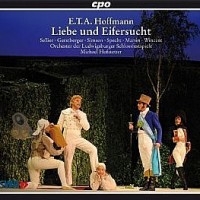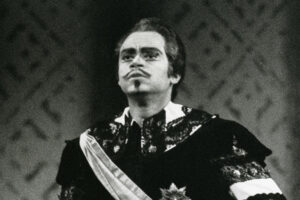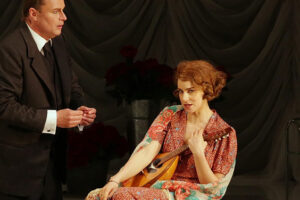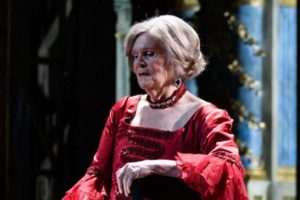
In 1804, E.T.A. Hoffmann became acquainted with Schlegel’s translations of Spanish plays in Spanisches Theater. During an illness in 1807, he returned to the Schlegel and discovered Calderon’s Die Scharpe und die Blume, finding it an ideal operatic subject. He composed the opera in Warsaw and Berlin, and began seeking a theatre that would present it…in vain.
He tried the Berlin National Theater, which refused it; he tried twice for the Bamberg Theatre, and was again refused; in addition, Leipzig music publisher Ambrose Kuhnel refused to print his compositions. Liebe und Eifersucht then fell into obscurity, and was considered lost until the 1960’s.
Hoffmann scholar Friedrich Schnapp first published the text written in the score in 1963. By 1970, the original libretto was discovered in the Wurtzburg City Archives, and Schnapp published it as a facsimile edition that same year. The score, edited from Schnapp’s estate papers, was finally published in 1999. At long last, a co-production by the Ludwigsburger Schlossfestspiele and the Staatstheater am Gartnerplatz of Munich in 2008 resulted in this CD issued by cpo.
The comic opera is set in Florence and concerns the convoluted love lives of The Duke of Florence and his nobleman, Enrico, who are in love with the two daughters of a local noble, Cloris and Lisida. There are jealousy, false promises, mistaken identities, comic servants and other stock devices all mixed together in the most confusing manner possible. Even after reading the libretto, I found it hard to remember who was actually in love with whom. It is a plot and a libretto that are, bottom line, much ado about nothing.
The music is quite pleasant, playful, and charming, but makes little comic or emotional impression. Mozart clearly influenced Hoffmann—there are hints of Don Giovanni, Nozze di Figaro, and Cosi throughout the piece—but Hoffman’s musical landscape is general, repetitive, and lacks the inventiveness that might have elevated the piece above Mozart Lite. The music has no real range, no “peaks and valleys”; it seems to remain safely in the cheerfully pleasant, inoffensive middle ground throughout. The single dramatic moment in the score, Enrico’s aria “Schutze mich, a gut ger Himmel”, lurches about awkwardly and heavily like the proverbial drunken sailor:
(In English translation)
“Grief, confusion, wild fits,
Deceptions, odd moods, worries,
Madness, jealousy’s poisonous spray,
Wherein everything is ordained,
Cease your pursuit of me this very day!”
The youthful cast of singers are mostly picked from the ensemble of the Staatstheatre am Gartnerplatz. Hoffmann’s music requires only light lyric voices, and all the principals have pleasant but undistinguished ones, lacking in individuality and much sense of character. The two sopranos playing the sisters, Christina Gertsberger (Lisida) and Therese Wincent (Cloris), have lovely voices but are so alike in timbre and phrasing that they are indistinguishable from each other without reading the libretto.
Tenor Robert Sellier as Enrico gives probably the best performance on the disc, with tonal purity and easy, gleaming high notes, but even he fails to project a sense of character. The comic servants Ponlevi and Celia, sung and spoken with panache by Stefan Sevenich and Sybille Duffy, generate the only real humor in the piece. I found the entire cast just as effective, and sometimes more so, in the spoken dialogue than in the singing.
Conductor Michael Hofstetter leads the Orchester der Ludwigsburger Schlossfestspiele in a lively reading of the score, highlighting the elegance of Hoffmann’s writing in the comic moments. Still, the shaping of the piece lacked finesse, and musical transitions were choppy.
The merit of this CD release lies in the pleasure of discovering a generally unknown opera by a composer we know best from Offenbach’s opera based on his stories. But the production and the opera itself are of limited musical interest, failing to ignite any sparks of great beauty or delight.

























Comments